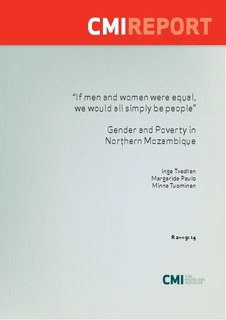| dc.contributor.author | Tvedten, Inge | |
| dc.contributor.author | Paulo, Margarida | |
| dc.contributor.author | Tuominen, Minna | |
| dc.date.accessioned | 2010-08-18T11:17:53Z | |
| dc.date.accessioned | 2017-03-29T09:13:15Z | |
| dc.date.available | 2010-08-18T11:17:53Z | |
| dc.date.available | 2017-03-29T09:13:15Z | |
| dc.date.issued | 2009 | |
| dc.identifier.isbn | 978-82-8062-378-2 | |
| dc.identifier.issn | 1890-503X | |
| dc.identifier.uri | http://hdl.handle.net/11250/2436076 | |
| dc.description.abstract | This is the second report in the series ‘Gender Policies and Feminisation of Poverty in Mozambique’. While the first report went through existing quantitative data on the national level, this report focuses on the social relations and cultural perception of gender in the rural district of Mossuril and the city of Nampula in the northern province of Nampula. Structural changes and more limited patriarchal control in urban Nampula have opened up opportunities for women that they do not have in rural Mossuril – where they remain generally disadvantaged and with few options for social mobility. Urban women and female headed households are more likely to be economically independent from men and invest in the well-being of their household members. | |
| dc.language.iso | eng | |
| dc.publisher | Chr. Michelsen Institute | |
| dc.relation.ispartofseries | Research report | |
| dc.relation.ispartofseries | R 2009: 14 | |
| dc.subject | Mozambique | |
| dc.subject | Poverty | |
| dc.title | "If men and women were equal, we would all simply be people". Gender and poverty in northern Mozambique | |
| dc.type | Research report | |
